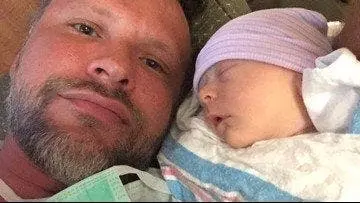I Thought I Had Kidney Stones And Gave Birth To A Baby 🫢

Able to affect any woman, the denial of pregnancy is a particular situation where questions and guilt reign for the new mother. Usually, a long road to resilience is necessary for the well-being of the mother and her child, as well as those around her. Stéphanie Jaegers lived this overwhelming experience, as shown by her testimony, broadcast by the New York Post.

According to a file from the French Association for the recognition of denial of pregnancy, denial of pregnancy affects approximately one in 500 pregnancies, however, it remains a taboo subject and a phenomenon that is not always well understood by future parents. and those around them.
denial of pregnancy
Denial of pregnancy is illustrated by an unconscious rejection of the pregnancy, leading to being pregnant without knowing it. Discovery of pregnancy can be made in the second or third trimester (partial denial) or at the time of delivery (full denial). It is a psychic defense mechanism where the woman ignores reality to protect herself from deep suffering.
In this situation we see all the power of the mind over the body because the brain hides the information of the pregnancy and the symptoms are invisible. Menstrual cycles persist, the stomach remains flat, and typical pregnancy symptoms such as nausea and fatigue are generally attributed to the disease.
The uterus, instead of stretching forward, develops in height and the fetus develops adapting to the place it occupies. Often the baby grows along the spine.
Once the pregnancy is discovered and assimilated, the belly and chest grow after a few hours and the sensations linked to the baby's movements are no longer linked to symptoms such as swelling. However, sometimes a woman does not realize that she is pregnant until the descent and expulsion of the baby.
From a psychological point of view, this phenomenon is particularly annoying for the future mother, the future father and relatives. Many questions follow the birth as well as the guilt of not having detected the pregnancy. In addition, the mother/child relationship and the attachment that normally occurs during the 9 months of gestation are altered. For this reason, a psychological follow-up is essential after the denial of pregnancy.

The denial of pregnancy affects women, regardless of their age, social origin or living conditions. Multiple causes may be at the origin of this denial, such as the social, relational and/or professional context of the woman. In the same way, stress, hormonal disorders or an infertility diagnosis make a woman believe that she cannot get pregnant, as the story of Stephanie Jaegers shows.
The testimony of Stephanie Jaegers
Feeling severe abdominal pain and thinking she was suffering from kidney stones, Stephanie Jaegers called her husband, Michael, to take her to the hospital. While there, the doctors examined Stephanie and asked if she was pregnant. She replied that this was not the case and therefore she was prepared to take X-rays.
However, after further observation, the doctors preferred to avoid X-rays and opted for an ultrasound, which astonished Michael. Finally, the latter confirmed the pregnancy and revealed to the couple that Stephanie was 38 weeks pregnant and was going to give birth.

Just thirty minutes later, Stephanie was placed in the delivery room, and the couple finally realized they were going to be parents again. Michael says, "When we heard the heartbeat, the reality of the pregnancy came true."
So, just hours after her arrival, Stephanie gave birth to Shaun Jude Jaegers, a healthy 3.3kg, 48cm baby boy.
Michael explained on his Facebook account that Stephanie went into pregnancy denial because she was diagnosed with perimenopause which warranted a high HCG result and that on her third pregnancy she was told she was unlikely to get pregnant again. In addition, she was still having a menstrual cycle, and the fact that she was immobilized due to an ankle injury took a possible pregnancy off Stephanie and Michael's minds.
The doctors explained to Stephanie and Michael that their son had thrived throughout the pregnancy and remained in a breech position.
Stéphanie and Michael's two sons and daughter took to this newcomer to the family very well, although their daughter was a little disappointed that she wasn't the youngest.
Finally, after the surprise effect, the entourage of the couple and relatives also shared the joy of receiving Shaun!
